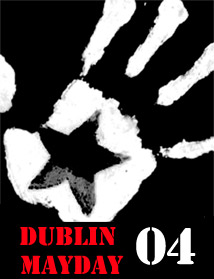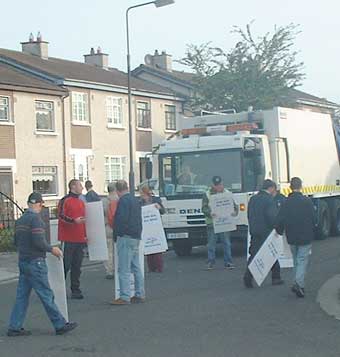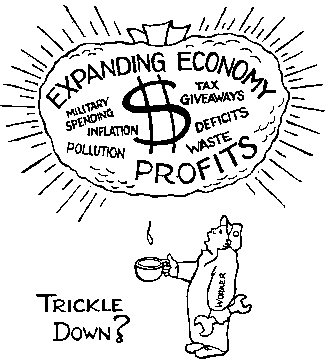Over 30 years of anarchist writing from Ireland listed under hundreds of topics
The Dublin EU Mayday protests of 2004 - The Ghost of Mayday Past

Compared to many other European countries May Day demonstrations have always been small in Ireland, even in the 1980's when the Stalinist left was much more influential and the unions were much more powerful. By the mid-1990's, with the old left in complete disarray and the union bureaucrats more focussed on partnership with the state and the bosses rather than workers' rights, May Day had become a fairly underwhelming event.
So, given this dismal tradition why were the explicitly libertarian May Day events in 2004, comparatively speaking, such a success? Of course there was the impetus of a major European Union summit but to understand why anarchists were in a position to organise big May Day events calls for a brief examination of the development of libertarian ideas and practices in Ireland over the past few years.
Learning from May Day: Organisational Problems
A look at some of the problems faced and mistakes made in the organisation of the Dublin EU Mayday summit protests in 2004.
Learning from May Day: Anti-Capitalist Strategy direct action, militancy and building the movement
The experience of May Day brings up us back to some of the perennial questions thrown up by counter-summits protests: how do we broaden our movement and what role do direct action and confrontational tactics have in that process. These are, of course, the issues that have been mainstay of Red and Black Revolution debates over the past few years but have been usually viewed through the prism of events outside of Ireland. The following article is a personal account of the Dublin Grassroots Network's approach to such issues in relation to May Day and goes on to argue for increased tactical flexibility from anarchists within the anti-capitalist movement.
Archive of older WSM articles on community struggles and organising

These are articles on Community Struggles that were published on our old web site prior to 2006 and which may not be on this new site yet. It does not include articles published from 2006 on - to see these click on Community under categories in the left hand box.
The Nomad, the Displaced and the Settler: Work in the 21st century
 In many countries there has been a debate as to the nature of the changes in western workplaces; in Britain they talk about increased casualisation of the workforce, in the US they talk about contingent labour and on the European continent they use the language of precarity. Central to in all these debates is the issue of job insecurity.
In many countries there has been a debate as to the nature of the changes in western workplaces; in Britain they talk about increased casualisation of the workforce, in the US they talk about contingent labour and on the European continent they use the language of precarity. Central to in all these debates is the issue of job insecurity.
A number of issues are being discussed. Firstly has the workplace changed fundamentally such that people increasingly are in temporary work rather than permanent work? Secondly is the division between work time and non-work time dissolving, are we spending more of our lives 'in work'? Thirdly are the non-work aspects of life becoming increasingly insecure?
Book Review: Parecon: Life After Capitalism
Anarchists, in common with all radical proponents of social change are continually asked what their vision of a new society/economy is. What is the "Master Plan", the "Blueprint" that will be followed? We are justifiably wary of outlining any "Blueprint" for an anarchist society that would suggest that it is THE solution and should be followed to the letter - who would enforce this great master plan after all!?
Book Review: To Live
For many people the 'civil war' within the Civil War that occurred in Spain between 1936-39 is a difficult business to understand. Not only were many different organisations involved, but it was set against the background of an even larger conflict that in itself was rife with brutality and betrayal. Although it appears at times to be an impossible quagmire to make sense of, Mick Parkin has succeeded admirably in his short novel To Live.
After Nationalism...Leaving Sinn Féin for anarchism
I joined Sinn Féin in the mid eighties with many others on the back of what we saw as a radical shift to the left and a commitment to build a 32 county Democratic Socialist Republic. I find myself outside that movement now, thoroughly disillusioned with it and its shift to a left nationalist and social democratic electoralist future.
Work in Ireland
Chainworkers means the 'workers in malls, shopping centres, hypermarkets, and in the myriad of jobs of logistics and selling in the metropolis'. Brainworkers means the knowledge workers, the programmers, the creatives and the freelancers. How do these categories pan out in the Irish labour market? Originally a box in the article The nomad, the displaced and the settler: Work in the 21st Century

